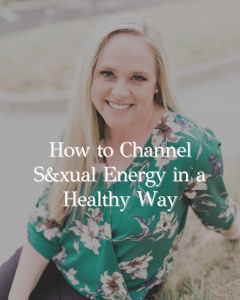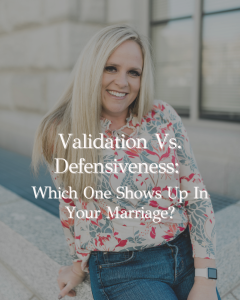
Do you remember what it was like when you were dating your husband? Every touch was electric. You felt alive, maybe for the first time. That was eros energy. The life-giving energy. The erotic energy. But now, after a few years and a few kids, do you still feel that way? For most of my clients, the answer is no. They have given up too much of themselves to their marriage and children that they don’t even know who they are anymore. Sound familiar? In this episode, let’s talk about how you can regain that eros energy. That energy that makes you feel alive!
Show Notes:
Follow Amanda on Facebook and Instagram.
Join Amanda’s Private Facebook Group.
References for this episode:
The State of Affairs by Esther Perel
Show Summary:
Remember when you were dating and engaged and what that felt like? The slightest touch was electric. The energy between you was palpable. You felt alive. Maybe for the first time. That was the eros energy. The life-giving energy. Erotic energy.
If it’s been a long time since you’ve had your juices flowing, if you are convinced that something is broken or wrong with you medically, you might be missing that eros energy in your life.
In Esther Perel’s book The State of Affairs she says “When I ask people what “being alive” means, they lay out a multifaceted experience. Power, validation, confidence, and freedom are the most common flavors. Add to these the elixir of love, and you have an intoxicating cocktail. There is a sexual awakening or reawakening, of course, but it doesn’t stop there. The awakened describe a sense of movement when they had felt constricted, an opening up of possibilities in life that had narrowed down to a single predictable path, a surge of emotional intensity where everything seemed bland.”
What does feeling alive feel like to you? What desires do you have that make you feel alive? And I’m not just talking about sexual desires, although that is an important piece, but just desires in general. We were given the desires that we have in this life for a purpose, to help guide us on a path to joy, happiness, and fulfillment.
Often we judge our desires. We think we can’t, we shouldn’t, we don’t have time for, that they are frivolous. But when we don’t follow our desires, that life-giving energy goes away. When we don’t follow our desires and dreams, we don’t have life. Our erotic energy is subdued in all areas.
I’ve noticed a theme coming up for a lot of my clients lately. They followed the prescribed path that they were given; college, maybe a mission, marriage, kids, but they have so much resentment. Of course they love their husband and children, but they’ve lost themselves. They feel like they weren’t given a choice of what their life could be like. Which actually isn’t true, but it feels very true, because life outside of the prescribed path felt wrong. So they did as they were expected and now live a life of resentment and regret. But the truth of the matter is, they did choose. And they can actually choose differently today if they want. They could walk away. They could leave their husband, their children, and live a life completely of their own choosing. But is that actually what they want? When it comes down to it, owning our choices and continuing to choose with intention of what we want our life to be can help us get over the resentment and anger we feel for thinking that we didn’t have choices.
In State of Affairs, Esther Perel says, “Home, marriage, and motherhood have forever been the pursuit of many women, but also the place where women cease to feel like women.” When we lose ourselves and quit pursuing our own wants and desires, instead conforming to what family, religion, and society says we should be, what our husbands want, and our children need, we often lose our zest for life.
We want to feel loved and connected, but more than that, we want to belong to ourselves. But often, trying to conform, we sacrifice the things that make us feel alive. Marta Meana, a prominent researcher says “women may be just as turned on by men by the novel, the illicit, the raw, the anonymous, but the arousal value of these things may not be important enough to women to trade in things they value more” (like family, emotional connectedness, stability, and safety.)
Again, Esther Perel says “Our emotional needs and our erotic needs do not always neatly align. For some, the security they find in the relationship gives them the necessary trust to play, to take risks, and to safely lust. But for many others, the nesting qualities that nurture love are the same ones that slowly stifle desire.“ (Close quote) When forced to choose, what do women do? Meana says “women choose good relationships over sexual pleasure.” Or in other words, women put their emotional needs ahead of their erotic needs, often denying that they even have erotic needs.
In my experience, it’s very common for women to make a shift once they get married. They shift from desire to duty. Sex becomes something that she SHOULD do, and then it becomes something she no longer WANTS to do. When we change from pursuing our own satisfaction to thinking that we need to prioritize our partners and others satisfactions, it stifles our own desires. And again, we lose that zest for life. We lose that eros energy. Psychotherapist and author Dalma Heyn calls this erotic silence. It’s an “unexpected, in-articulable deadening of pleasure and vitality that happens to some women after they tie the knot.” She goes on to say that “A woman’s sexuality depends on her authenticity and self-nurturance.” “Yet marriage and motherhood demand a level of selflessness that is at odds with the inherent selfishness of desire. Being responsible for others makes it harder for women to focus on their own needs, to feel spontaneous, sexually expressive, and carefree. For many, finding at home the kind of self-absorption that is essential to erotic pleasure proves a challenge. The burdens of caretaking are indeed a powerful anti-aphrodisiac.” (Esther Perel)
In Meana’s research, she identified three core themes that “represent the dragging forces on sexual desire.”
- The institutionalization of the relationship – a passage from freedom and independence to commitment and responsibility
- The overfamiliairty that develops when intimacy and closeness replace individuality and mystery
- The desexualizing nature of certain roles – mother, wife, and house manager
She says that all three of these promote the de-eroticization of the self.
So given the circumstances, what can women do to combat this? Esther Perel concludes that we have to navigate these fundamental polarities in each of us. “Rather than being anchored in the safe side of the continuum, female sexual desire requires a balance between opposing impulses…of comfort and freedom, of security and risk, of intimacy and individuality.”
In other words, you have to intentionally work to reclaim yourselves and your desires and integrate them into your lives to achieve balance. You have to work to find yourself again, outside of the role of wife, mother, and house manager. I see many women trying to do this by seeking out employment, a side-hustle, crafting, exercising. All of these are great things that can definitely contribute to you reclaiming that eros energy. But unless you are willing to address the sexuality piece of it, something will always be missing. You have to step into a self-reclamation where you can let go of the duty and obligation and step into feeling awake and alive, strong and focused, and understand that you are worth this.
Often my clients tell me that after working with me, they feel alive again. It was like waking up from a long winter hibernation, but they didn’t even realize how asleep they had been. Some describe it feeling rejuvenated, intense, revitalizing, renewing, vibrant, liberating.
For some, this reawakening can feel very scary. And it can be. To let go of deeply held belief systems is very uncomfortable. While you often find safety and security in current circumstances, staying stagnant with how things currently are is also uncomfortable. So if it’s going to be uncomfortable either way, why not put the effort in to growth and making things better in your marriage and intimate relationships. Why not reclaim the desire and eros energy that makes you feel more alive. And if you decide to come into my coaching membership, you will have my support as well as other women’s support as you go through this process. It is often easier to make these changes when we see that we are not alone in this and have support.
It’s time to reclaim your desires. To reclaim that eros energy. It was there once and it can be there again with a little help.




